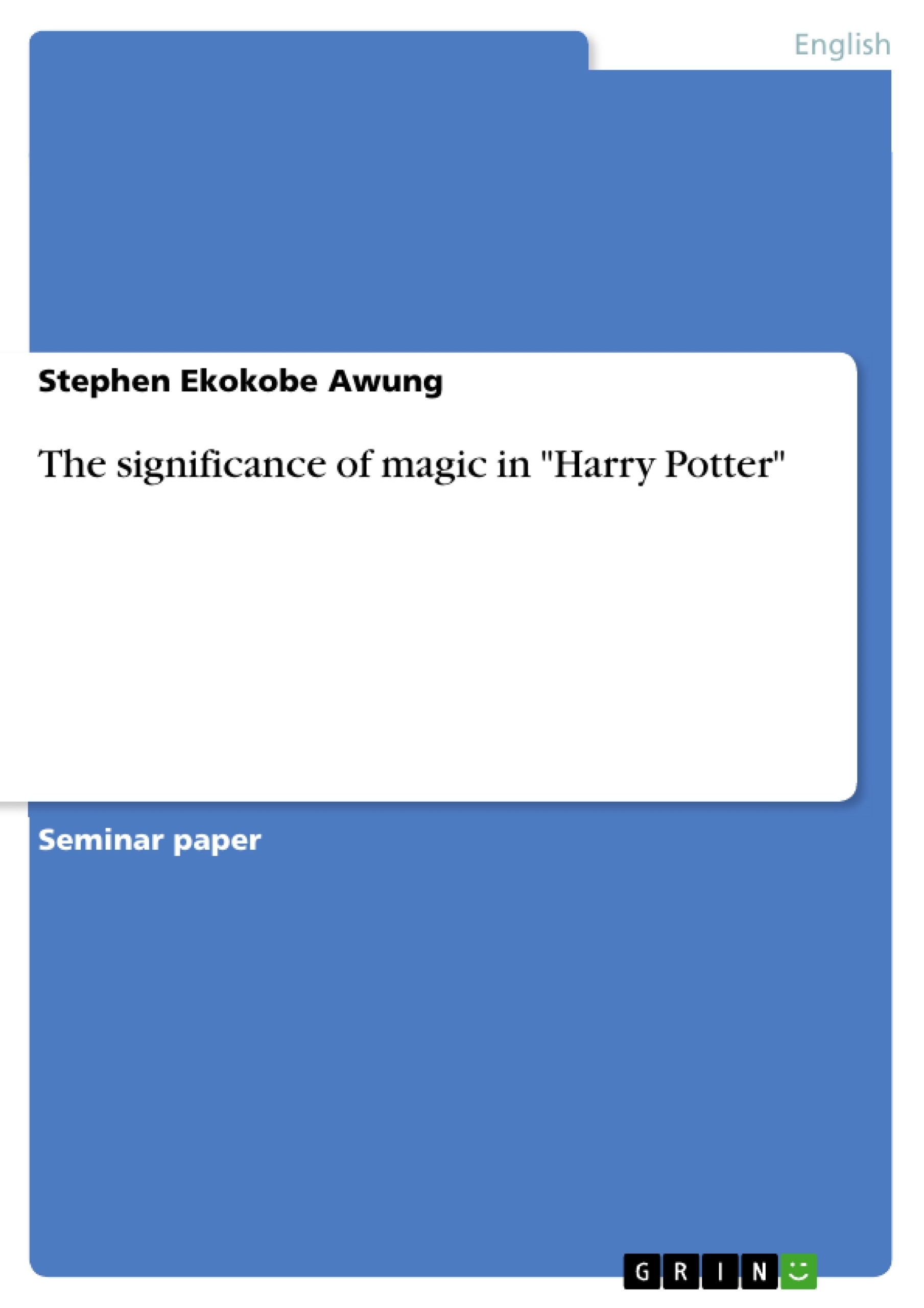In this paper, we would like to discuss magic as portrayed in J.K. Rowling "Harry Potter". We want to also analyze some magic scenes and attempt to discuss their significance in the story.
Harry Potter has never been the star of a Quidditch team, scoring points while riding a broom far above the ground. All he knows is a miserable life with the Dursleys, his terrible aunt and uncle, and their son, Dudley, a great swollen spoiled bully. Harry’s room is a tiny closet at the foot of the stairs, and he has not had a birthday party in eleven years. But all that is about to change when a mysterious letter arrives by an owl messenger.
The letter is an invitation to an incredible place that Harry will never forget. For it is Hogwarts School of Witchcraft and Wizardry where Harry finds not only friends, sport, and magic in everything from classes to meal, but a great destiny that has been waiting for him.
Table of Contents
- 1. INTRODUCTION
- 1.1 The meaning of Magic
- 2. Some scenes of magic in Harry Potter
Objectives and Key Themes
This paper aims to explore the portrayal of magic in J.K. Rowling's Harry Potter, analyzing specific scenes and their significance within the narrative. The analysis will consider the multifaceted nature of magic, its cultural interpretations, and its juxtaposition with science.
- The definition and cultural interpretations of magic.
- The comparison and contrast between magic and science.
- The portrayal of magic in specific scenes from Harry Potter.
- The role of magic in shaping character development and plot.
- The similarities and differences between the magical and Muggle worlds.
Chapter Summaries
1. INTRODUCTION: This introductory chapter delves into the multifaceted concept of magic, exploring its diverse definitions across cultures and societies. It contrasts the understanding of magic as supernatural phenomena with scientific advancements, highlighting how technological innovations that were once considered magical are now commonplace. The chapter uses examples from various cultures and historical periods to illustrate the fluidity of the term "magic," arguing that its interpretation is heavily influenced by societal context and belief systems. The chapter lays the groundwork for analyzing the depiction of magic in the Harry Potter series by establishing a broad understanding of the concept's complexities.
2. Some scenes of magic in Harry Potter: This chapter analyzes specific scenes from Harry Potter and the Sorcerer's Stone to illustrate Rowling's portrayal of magic. It focuses on Quidditch, a magical sport, and wizard chess, highlighting how these activities demonstrate both the unique aspects of the magical world and its parallels with the Muggle world. The chapter also examines smaller instances of magic within the narrative, such as a self-measuring tape and a levitating feather, to illustrate the everyday integration of magic into the lives of the characters. These examples demonstrate the scope and pervasiveness of magic within the story's world, and its role in character interaction and development.
Keywords
Magic, Harry Potter, J.K. Rowling, Science, Culture, Muggle world, Quidditch, Wizard chess, Supernatural, Fantasy, Comparative analysis, Literary analysis.
Harry Potter: A Comprehensive Language Preview - FAQ
What is this document?
This document provides a comprehensive preview of a language analysis paper focusing on the portrayal of magic in J.K. Rowling's Harry Potter series. It includes a table of contents, objectives and key themes, chapter summaries, and keywords.
What are the main objectives of the paper?
The paper aims to explore the portrayal of magic in Harry Potter, analyzing specific scenes and their significance. It will examine the multifaceted nature of magic, its cultural interpretations, and its comparison with science. The analysis will also consider magic's role in shaping character development and plot, and the differences between the magical and Muggle worlds.
What key themes are explored?
Key themes include the definition and cultural interpretations of magic, the comparison between magic and science, the portrayal of magic in specific Harry Potter scenes, the role of magic in character development and plot, and the similarities and differences between the magical and Muggle worlds.
What is covered in the Introduction chapter?
The introduction delves into the multifaceted concept of magic, exploring its diverse definitions across cultures. It contrasts magic with scientific advancements and uses examples to illustrate the fluidity of the term "magic," emphasizing its societal and contextual influences. This lays the groundwork for analyzing magic's depiction in Harry Potter.
What does the chapter on "Some scenes of magic in Harry Potter" cover?
This chapter analyzes specific scenes from Harry Potter and the Sorcerer's Stone, such as Quidditch and wizard chess, to illustrate Rowling's portrayal of magic. It highlights both the unique aspects of the magical world and its parallels with the Muggle world, also examining smaller instances of magic to show its pervasiveness and role in character interaction and development.
What are the keywords associated with this paper?
Keywords include: Magic, Harry Potter, J.K. Rowling, Science, Culture, Muggle world, Quidditch, Wizard chess, Supernatural, Fantasy, Comparative analysis, Literary analysis.
What kind of analysis does this paper conduct?
The paper employs a comparative and literary analysis approach, examining the portrayal of magic within a specific fictional context (Harry Potter) and relating it to broader cultural and scientific understandings of magic.
What is the intended audience for this document?
This preview is intended for academic use, supporting the analysis of themes in a structured and professional manner.
Where can I find the full paper?
The full paper is not included in this preview. Further information regarding access to the complete work may be available from the publishing company.
- Citation du texte
- Stephen Ekokobe Awung (Auteur), 2000, The significance of magic in "Harry Potter", Munich, GRIN Verlag, https://www.grin.com/document/453092



